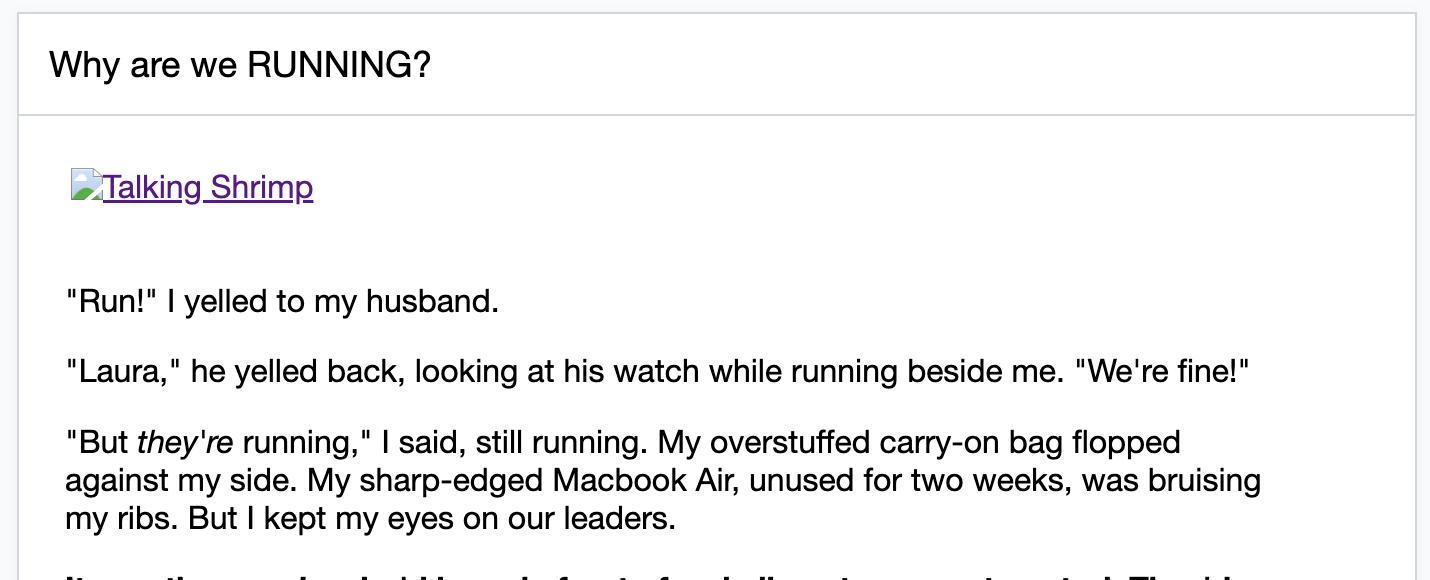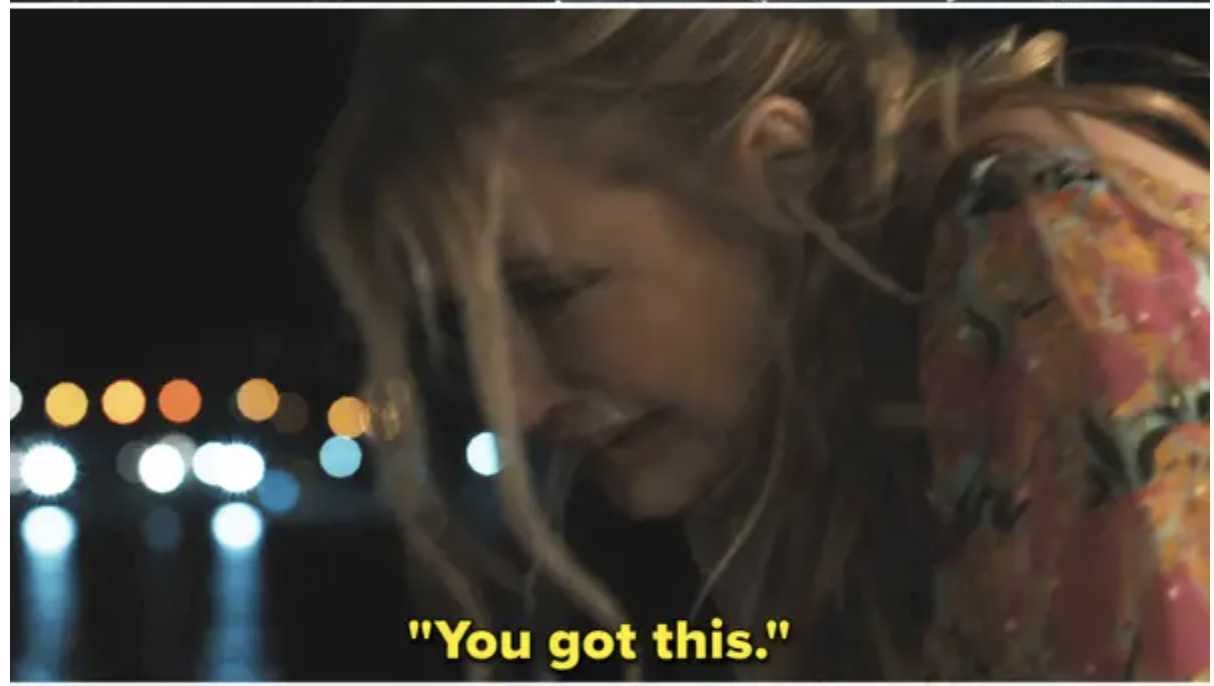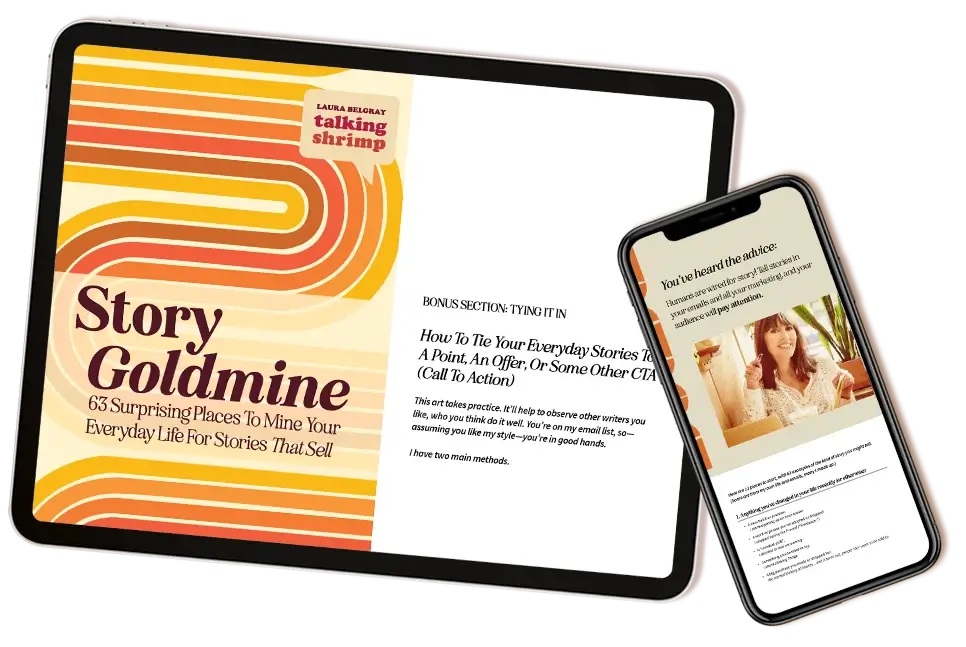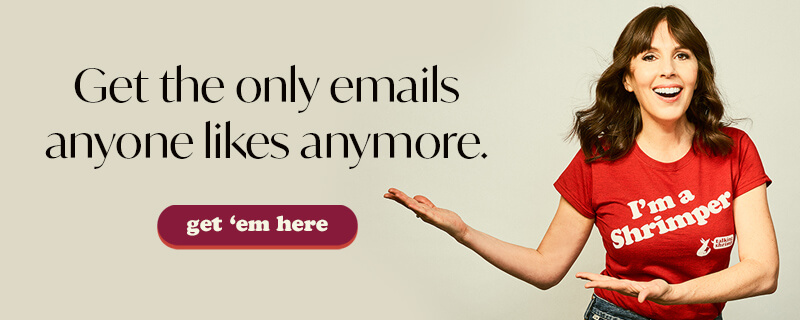
There are plenty of binge-worthy shows in the mix. (And yet, never enough.)
But it’s rare for a series or season to become actual, real-time appointment viewing, and be the one thing everyone’s talking about.
I don’t think I’ve made sure to “tune in” to a season finale right at the start time since the last episode of The Sopranos…in 2006.
Extra layer: by the middle of White Lotus Season 2, we were even obsessing over the show creator. Mike White is now living in our brains! We’re in for whatever he does next. (Heck, I’m even planning to dig up his season of Survivor, a show I haven’t watched since Season 1 with Richard Hatch.)
Here are 7 ways to get that addictive, can’t-get-enough, live-in-your-audience’s-brain factor into your storytelling content and copy, especially your emails.
Or, for short…
How to “White Lotus” your writing (especially your email copy) in 7 steps
1. Bring the mystery (AKA open loop AKA curiosity gap)
Both season one and season two open with a dead body, and then cut to one week earlier, when all the White Lotus guests arrive.
From the jump, we’re itching to solve the mystery:
Who’s gonna die?
I personally didn’t need the mystery death to keep me hooked. I was curious enough about what would happen with all the characters, especially the two couples who were headed for some kind of thrilling shit-show from the moment they checked in (and were shown the adjoining room door between their suite).
How to add the mystery/open loop
You don’t have to kill someone to activate this tension.
Your subject line can (and should) arouse curiosity. A recent one of mine was:
Subj: Throbbing
You can see other highly-clicked favorites here.
Or start your story “in media res” — in the middle of the action.
One of my fan-favorite emails (Subj: Why are we RUNNING?) starts,
“Run!” I yelled to my husband.
You’re thrown right in. You keep reading to find out the answer.
Another type of open loop: start with “It all started when…”
For instance:
It all started when I wandered into my corner coffee shop.
What all started? Don’t you want to know? That curiosity will keep you reading.
Want help arousing curiosity at first sight, with must-click subject lines? Grab my guide to subject lines that get opened below.
Non-Sucky Subject Lines
My 33 Most-Opened Emails,
Plus 4 That Tanked…
**With TEMPLATES To Make Your Own!**
Download The Non-Sucky Subject Lines.
2. Set up stakes.
The stakes may seem low for a bunch of rich people vacationing in a hotel that costs 5k/night for an ocean view king, but every character has dreams, desires, or problems, and stands to lose or gain something on this trip. For example, at the outset:
- Tanya’s new marriage is already in trouble, and she’s a desperately, hilariously needy woman.
- Portia is lost in life and wants “adventure” (which she’ll get, all right) but she’s been ordered to stay in her room. She wants…not that.
- One couple (Ethan and Harper) isn’t sure what the other couple (Cameron and Daphne) want from them, but it’s something.
- Dominic wants to save his marriage, but also wants to sleep with hookers.
- Lucia, the local professional escort, needs to make a living — and move about the hotel without being booted by the manager, Valentina.
- Mia, her friend, badly wants to become a professional singer. Knowing her dream and what it means to her is why we root for her.
How to set up stakes
Show us hangs in the balance, by bringing in the protagonist’s desire or goal and what they stand to lose or gain.
If you tell a story about, say, losing your job, don’t just tell us what you did next.
Tell us what that meant to you.
Did you secretly want to lose your job? Or had you counted on that job, financially, emotionally, or both? We don’t know unless you show us.
And were you…
- Already behind on mortgage payments?
- Ashamed to tell your family?
- Stripped of your identity and self-worth?
- Extra humiliated, because you’d just bragged to everyone about a big promotion?
- Finally free from your shit boss?
What was at stake? Fill us in, so we’re emotionally invested, too.
3. Give the story conflict.
No good story goes, “Everyone got along great, and no one had any complaints or issues, all in all it was a wonderful time!”
That’s a TripAdvisor review, not a story.
White Lotus, like all great TV, is wall-to-wall conflict. Not one smooth, tension-free moment in the show. Even the “made for the Gram” moments are fraught, for example:
- Every Aperol spritz “cheers” among the 2 couples is loaded with “we do not see eye to eye on life” vibes.
- Scene 1: Daphne happily plunges into the glorious Mediterranean for “one last swim”…and bumps into a dead body.
- Tanya and Greg’s Sicilian Vespa ride, per her Italian fantasy, is a near-death series of hairpin turns on a cliff while she’s dangerously clutching Greg and choking on a bug.
How to give your stories conflict
Your writing doesn’t have to be all doom, pain, arguing, passive-aggressive jabs, letdowns, failures, bitterness, and/or possible murder, but even if you tell us a happy story, there should be some tension to make it…well, an actual story.
Consider:
“I’ve found the apartment of my dreams! Things are always going my way!” (No conflict, no story – Zzzzz 😴)
vs.
“I’ve found the apartment of my dreams! What a relief, after looking at a series of overpriced hell-holes and nearing our move-out date.”
or
“I’ve found the apartment of my dreams! A few years ago, there’s no way I could have afforded it.”
or
“I’ve found the apartment of my dreams—but here’s why I’m shitting my pants about signing the lease.”
Happy is great, but we stay for the conflict.
4. Be relatable
(Extra shoutout for this one to Jen Olmstead of Tonic Site Shop, whose post here inspired this whole post.)
If you enjoyed White Lotus, you probably related to at least someone on it. Even if you hated them, it was probably because you related. (We loathe in others what we secretly hate in ourselves, right?)
Maybe you related to…
- Harper, who’s stuck on vacation with a couple who aren’t her scene and is dying the whole time to say to one of them what she finally does in the end: “You’re an idiot.”
- Poor, savior-complex, “born for the friend zone” Albie.
- Portia, who’s sick of screens and “the discourse,” is attracted to inappropriate guys, and, like me (sad to say), dresses all wrong for a resort and wants to wear sneakers with her dress.
- Even douchebag Cameron, who’s clearly jealous of his newly rich friend Ethan’s sudden success.
How to be relatable
Show your flaws, insecurities, weird habits, contradictions, f’d up daddy issues. All of it. Perfection doesn’t create connection.
And not: “My greatest flaw is that I care too much!”
That kind of BS won’t make you the hero or make us feel connected to you
Share what you’re nervous to share.
One of my most replied-to emails was called “When I go to the dark place” and shared shitty feelings about my industry and my part in it. That was to an audience of people I still wanted to buy from me.
5. Show, don’t tell — with concrete details.
In the first episode, Greg complains to Tanya, “You ate all the macaroons,” and asks how she expects to lose weight when she’s eating all the macaroons. (He means “macarons,” but tomato, tomahto.)
It’s little moments like that that make the show. A (much, much) lesser writer might have had Greg say, “I’m no longer attracted to you, everything you do annoys me, and the bloom is off the rose.” — but Mike White lets that be subtext.
How to show, not tell
Paint a picture with concrete details.
Instead of “He became furious and aggressive, making everyone in the room wonder what they did wrong,”
How about:
“He yanked off his conference badge and threw it on the floor before storming out. We looked at each other, wide-eyed. Something we said?”
6. Throw in Easter eggs
White Lotus is loaded with little moments, clues, and callbacks for fans of the show and of Mike White to spot. It makes us feel like insiders, and makes us all the more loyal for it.
Just a few:
- Mike White’s fellow cast members from Survivor in the first scene
- Tanya’s floral print dress matching the one on the doomed mannequin from The Godfather in the car
- Cameron’s “bad case of mimetic desire” — needing to take from Ethan, someone of higher status — mirroring the relationship between the 2 teen girls in season 1
- All that star (and starfish) jewelry, most notably the fugly starfish pin Valentina gives Isabella: maybe a wink to the lyric, The stars belong to everyone in “The Best Things in Life are Free,” sung by Mia—wearing star earrings—in episode 2 and bookended by the Sam Cooke rendition in the finale?
How to throw in Easter eggs
It doesn’t have to be Mike White genius-level, or hint at who’s going to die, to make your audience feel like superfans and insiders.
Populate your universe (and emails) with repeating…
– themes (eg, one of mine: laziness)
– pop culture references (my most common one: Real Housewives)
– people in your life (most frequent cameo in my stories is my husband, Steven)
– Habits (my Shrimpers know all about my daily iced coffee and watermelon chunks)
Etc.
Your regulars will catch your Easter eggs and feel very “inner circle” VIP.
7. Leave them wanting more
In my dreams, we get a new White Lotus episode every day, Monday through Friday, all year round—like General Hospital.
But seven episodes is what we got (a mere six in Season 1).
I’m sure there’s so much Mike White could have added to bring it up to ten episodes, at least. But he exercises this thing called “economy.” Sigh. And that makes it tighter and better.
No one who loves White Lotus got a chance to be sick of it. We’re all asking, “Can season 3 start now, please?”
How to leave them wanting more
Make your stories, especially in your emails, only as long as they need to be.
- Use details, yes, but cut the ones that aren’t important. You don’t have to describe the “crisp, fall weather” and “chimes of the door” on your way in to the coffee shop if the story is about, say, being annoyed by the tip suggestions on the iPad screen.
- Most of the time, losing your first paragraph will make the writing better.
- Any words you can cut and not change the meaning of the sentence, buh-bye.
- Fun asides are, well, fun. Go ahead and write them. But when you edit, cut most of them. If they take us out of the story, we might click away and see what’s up over on TikTok.
And that’s how you do it. White-Lotus-level emails to keep your audience hooked on you and whatever you sell. As Tanya would say…
Oh wait, you don’t got this? Need help mining your everyday life for stories that sell (even if your life is boring and not a murder-filled Sicilian adventure dreamed up by Mike White)?
I got you.









I love this almost as much as I love White Lotus (season 2). Be sure to check out Enlightened if you need another Mike White fix (he even has a role in it). And now I’m going to Lotus -up the email I’m about to write.
thanks!